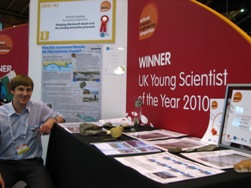
Sarah Day visits the 2010 Big Bang Fair in Manchester and discovers that when communicating “climate change” science, nothing – even the terms we use, should be taken for granted.
Geoscientist 20.05 May 2010
The writing of the Geological Society’s statement on climate change is currently underway, and has caused a fair few raised eyebrows, as well as eager anticipation, among the Fellowship. While some might question the wisdom of wading into the increasingly muddy waters of the ‘great debate’ on climate change, it is becoming increasingly clear that effective communication between scientists and the public is about more than just edification.
Climate change, despite having been the flavour of the month with journalists and politicians for a long time, is still desperately misunderstood by much of the public. No wonder, with so little of what’s being discussed being about real science, rather than endless back-and-forth about politics and conspiracy theories. Especially worrying is that these misunderstandings are not about what scientists and science writers might expect.
The problem came to light at the Big Bang Fair in Manchester, where the Science Council was asking young people between the ages of 7 – 19 (and a few over-enthusiastic adults) to write a postcard to the Prime Minister stating what they thought about climate change. Among the nearly 2000 responses, a predictable spread of opinions was gleaned, from ‘…is very bad’ and ‘needs sorting out’ to ‘is not real’ and ‘is a natural thing’.
Among these, a trend emerged. Several responses were along the lines of “climate change is good. We need to stop polluting the air”. Some children were viewing climate change as a man-made response to global warming, a bit like “geoengineering”; which goes to show, when it comes to communicating science, assume no prior knowledge. When the very definition of phrases like ‘climate change’ are misunderstood, how can we be sure the messages we try to put across are being understood in the way we intend?
When it comes to engaging the public over changing climate, young people are the most important target group, and their enthusiasm for science is an important place to start. The Big Bang Fair, part of National Science and Engineering Week, is one of a number of initiatives that share this aim. Now in its second year, the March event was bigger and better organised than the inaugural show in London. Four coloured ‘zones’ divided up the vast and airy space of Manchester Central, a former railway station, now a modern conference centre.